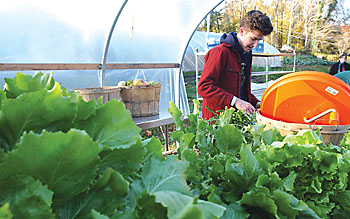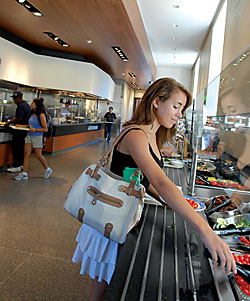YALE’S GROWING ‘GREEN’ INITIATIVES |
| SPECIAL SUPPLEMENT
SPECIAL SUPPLEMENT |
| APRIL 2008
APRIL 2008
 | Working on the Yale Farm gives students first-hand experience in sustainable agriculture. |
In dining halls and classrooms, project
raising awareness about relationship
between ‘people, land and food’
The grass-fed-beef burgers now on the menu in Yale’s dining halls are
not only healthier for students than the conventional patties once served there,
they are healthier for the environment too.
Every one of the burgers, which are made from cattle raised locally, prevents
Yale from producing nearly a pound of carbon emissions that would otherwise
be used to transport the food from a source farther afield. Campus dining halls
have served a quarter-million of the grass-fed-beef burgers since 2003, thereby
reducing Yale’s carbon footprint by nearly a quarter-million pounds.
And the burgers are only one of many locally grown or organic additions to
the campus dining halls’ menus that have been introduced since the creation
of the Yale Sustainable Food Project.
The U.S. food system accounts for 17% of the nation’s energy use (second
only to the country’s vehicular use), and the Sustainable Food Project
is working to raise awareness of this everyday energy drain, and to change
Yale’s operations so as to make the University a model of sustainability
around food and agriculture.
Founded in 2001 by a group of faculty, staff and students, along with President
Richard C. Levin and renowned chef Alice Waters, the Yale Sustainable Food
Project is working to foster a culture that “draws meaning and pleasure
from the connections among people, land and food.” It directs a sustainable
dining program at Yale, manages an organic farm on campus, and runs diverse
programs that support exploration and academic inquiry related to food and
agriculture. Through the project’s efforts, Yale is becoming a center
for academic work related to food and agriculture.
The philosophy of the project, co-directed by Josh Viertel and Melina Shannon-DiPietro,
is clearly laid out on its website (www.yale.edu/sustainablefood):
“The world’s most pressing questions regarding health, culture, the
environment, education and the global economy cannot be adequately addressed
without considering the food we eat and the way we produce it. By creating opportunities
for students to experience food, agriculture and sustainability as integral parts
of their education and everyday life, the Sustainable Food Project ensures that
Yale graduates have the capacity to effect meaningful change as individuals and
as leaders in their communities, their homes and their life’s work.”
The following is a look at some of the project’s initiatives.
 | Today, sustainable food comprises 40% of the menu in Yale's dining halls.
|
Sustainable dining
Today, 40% of all food on the menus in Yale’s dining halls is sustainable.
That translates to a sustainable entrée at every lunch and dinner, and
an all-sustainable menu on Thursdays and on special occasions. The effort to
introduce environmentally responsible food practices in campus dining halls
began in 2003, when the Berkeley College dining hall became the most popular
eatery on campus after its test kitchen began serving local, seasonal and sustainable
food to Yale students on a daily basis. The pilot project earned such rave
reviews that soon sustainable foods were being served in all the residential
colleges. In fact, sustainable food has become very popular with students;
in the fall 2007 dining survey, 77% of student respondents said that expansion
of the Sustainable Food Project was very important to them.
In addition, the Sustainable Food Project played a role in developing the all-organic
menu for the new Library Café in the Bass Library, worked with Yale
Catering to expand their sustainable options and advises campus groups on ways
to incorporate sustainable foods into their events.
The result of all these efforts: In the 2006-2007 academic year, Yale redirected
$1.6 million into the regional economy by purchasing food using the guidelines
developed by the Sustainable Food Project. The savings in carbon emissions
from the shorter transportation requirements are also helping Yale to meet
its greenhouse gas emissions reduction targets.
The Yale Farm
In 2003, the same year the Berkeley pilot program was launched, students broke
ground on an acre of land in Yale’s Farnam Gardens on Edwards Street
to create an entirely different type of growing space: the Yale Farm, a market
garden that gives students first-hand experience in the principles and practice
of sustainable agriculture.
In the summer, the farm is maintained by six full-time undergraduate interns
who work the land while learning about sustainability and agriculture from
local farmers and others. During the academic year, these interns pass on their
knowledge while directing the student volunteers who work on the Yale Farm.
The crops grown throughout the year — including those raised in the farm’s
unheated greenhouses during the winter — are given to volunteers or sold
at CitySeed’s Wooster Square Farmer’s Market. The Union League,
a New Haven restaurant, often features produce from the farm, and spinach from
the garden has even been used in experiments in Yale chemistry professor Gary
Brudvig’s laboratory.
Professors from several campus departments use the garden as part of their
coursework, and teachers from New Haven schools bring their classes to the
Yale Farm for lessons in ecology, science and food production. The garden has
also been the site of workshops in everything from canning tomatoes to making
bread. Many of these events take place around the wood-burning hearth oven,
which is used each Friday to cook pizzas for volunteers.
In the fall, the Yale Farm will be constructing an open-air pavilion that will
offer a shelter space for the Yale Sustainable Food Project’s educational
and social activities.
Educational initiatives
As part of its mission to encourage students to think differently about food — particularly
about the impact of crop production on the environment — members of the
Sustainable Food Project have worked closely with Yale professors to introduce
topics related to food and agriculture into their courses. In 2006-2007, there
were 26 such offerings. The project also worked closely with Professor John
Wargo of the Yale School of Forestry & Environmental Studies to offer a
new concentration in sustainable food and agriculture within the Environmental
Studies major.
In addition to its hands-on workshops, the Sustainable Food Project this year
also launched the Lazarus Speaker Series, which has brought luminaries to campus
to discuss questions about health, culture, the environment, politics and the
global economy. The project has also sponsored several film screenings and
workshops.
Harvest pre-orientation program
Each fall, incoming freshmen learn firsthand about organic farming, while also
meeting their new classmates, through the Harvest pre-orientation program.
For five days, the students live on local farms — some of the same ones
that supply produce to Yale’s dining halls. There, they engage in activities
ranging from planting crops to constructing a chicken tractor (a portable hutch
that is used to harness chicken-power to remove a garden’s weeds and
bugs). Participants also have the opportunity to enjoy nearby trails and ponds.
Last year, 57 freshmen took part in the program on seven different local farms.
Outreach
In the fall of 2007, the University was the site of “The Real Food Summit,” a
gathering of students from 50 colleges in the Northeast designed to change
the culture of food on campuses across the region and, ultimately, the nation.
The event was organized by the Yale Sustainable Food Project, the Food Project
in Boston and the Brown Sustainable Food Initiative, along with a group of
students from the participating colleges. The summit also kicked off the Real
Food Challenge, a collaborative network that will serve as a resource to students
seeking to change their colleges’ food culture. At the summit, student
delegates wrote and ratified the Real Food Declaration, a document calling
on their university administrations to change the way their campuses think
about food and agriculture.
As a model program, the Yale Sustainable Food Project is becoming a resource
for numerous other initiatives. The Smithsonian Museum in Washington, D.C.,
asked the Yale Sustainable Food Project to design and install a model schoolyard
garden on the National Mall for its annual Folklife Festival. The project’s
staff members have also spoken about the project at the New Crowned Hope Festival
in Vienna, Austria, and Slow Food International’s bi-annual conference
in Torino, Italy.
The members of the project are also currently putting together a set of guidelines
for other organizations that address the complex issues surrounding sustainable
purchasing, such as whether it’s better to buy organic food from afar
or conventionally grown food from local sources.
For further information about the Yale Sustainable Food Project, visit its website at www.yale.edu/sustainablefood.
-
Introduction
Leading by action to promote a better future
New energy programs helping Yale to achieve its goal of
reducing greenhouse emissions 43% by 2020
Newest campus buildings have many earth-friendly features
Office works to make sustainability ‘everyone’s business’
In dining halls and classrooms, project raising awareness about relationship between ‘people, land and food’
Recycling ensures University’s trash is not going to waste
Regulated waste gets special treatment at OEHS
Eli Exchange
Adding zip to Yale’s sustainable transportation options
F&ES dean is an advocate for environmental action on and off campus
Yale experts tackling wide range of environmental issues
Scores of educational programs are devoted to ecological topics
‘Eco-friendly’ Yale merchandise
-
Yale Bulletin & Calendar
|

 YALE’S GROWING ‘GREEN’ INITIATIVES
YALE’S GROWING ‘GREEN’ INITIATIVES |
| SPECIAL SUPPLEMENT
SPECIAL SUPPLEMENT |
| APRIL 2008
APRIL 2008

